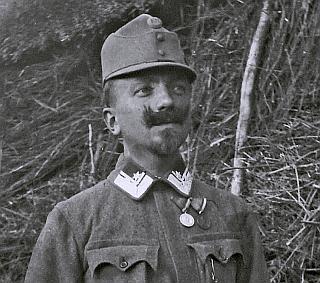
Jan Vaněk was arguably the most obvious of all the prototypes of characters in The Good Soldier Švejk.
The Who's who page on Jaroslav Hašek presents a gallery of persons from real life who to a varying degree are associated with The Good Soldier Švejk and his creator. Several of the characters in the novel are known to be based on real-life people, mostly officers from Infanterieregiment Nr. 91. Some of Hašek's literary figures carry the full names of their model, some are only thinly disguised and some names diverge from that of their "model", but they can be pinpointed by analyzing the circumstances in which they appear.
A handful of "prototypes" are easily recognisable like Rudolf Lukas and Jan Vaněk, others like Zdeněk Matěj Kuděj and Emanuél Michálek are less obvious inspirations. One would also assume that most of these characters borrow traits from more than one person, one such example is Švejk himself.
A far larger number of assumed prototypes are connected to their literary counterparts by little more than the name. Josef Švejk is here the prime example, but Jan Eybl also fits in this category. The list of prototypes only contains those who inspired characters that directly take part in the plot.
Researchers, the so-called Haškologists, are also included on this page but this list is per 15 June 2022 restricted to Radko Pytlík and two important but relatively unknown contributors to our knowledge about Hašek and Švejk. In due course entries on other experts like Václav Menger and Zdena Ančík will be added.
 | Morávek, Jan | ||||
| *1.5.1888 Kamenný Přívoz - †14.4.1958 Praha | |||||
| |||||

Morávek should rightly be considered the first ever "švejkologist" as he was a pioneer in pinpointing the parallels between the The Good Soldier Švejk and the author's own experiences in k.u.k. Heer. He published his findings in a sixteen part series in Večerní České slovo from 1 September to 4 October 1924. The series is based on post-war interviews with Rudolf Lukas and Jan Vaněk and also the latter's diaries. Morávek reveals that a number of Jaroslav Hašek's literary figures were inspired by people that the author met during his seven month service in the army[a].
The series appears quite trustworthy although the number of dialogues and leaning towards "beletrie" to a degree diminishes its value as a primary source. However, none of the interviewed parts ever openly contradicted Morávek's version, but at the end the author makes comments that suggest that the veracity of his series had already been questioned.
Ground for sceptiscism
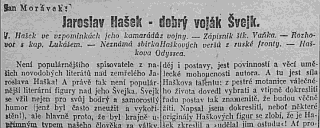
,1.9.1924
His description of the circumstances around Jaroslav Hašek's decoration is particularly dubious. It contains several minor factual errors, but more importantly, it is flatly contradicted by the author's Belohnungsantrag and also that of Jan Vaněk.
These two documents do not mention the "300 Russian prisoners" that Hašek and Vaněk according to Morávek brought into captivity. It is also striking that none of the recently discovered (2014) diaries of Jan Eybl and Jan Vaněk mentions this "deed".
A similar story does however show up in Rudolf Lukas' obituary. Jaroslav Hašek was given the task to lead a group of Russian prisoners to divisional HQ but he let them keep their guns, assuming they were happy to have the war behind them anyway. This understandably caused panic when they arrived at HQ, which again reflected badly on Lukas. This was however NOT the reason why Hašek and Vaněk were decorated.
Another unlikely claim is that Hašek's superiors requested that he be pardoned a three year sentence for desertion because he "led the whole battalion across the river Ikva, having used his knowledge of Russian to ask the locals where the ford was". There is however no trace of any conviction in Jaroslav Hašek's service record from k.u.k. Heer. A three year sentence is no minor matter and would have had to be imposed by a military court. He was allegedly also proposed for promotion in connection with this deed. Jaroslav Kejla, who was present by the Ikva on 18 September 1915 when the river crossing took place, flatly dismisses the story as "pure invention"[b].
The Bad Soldier
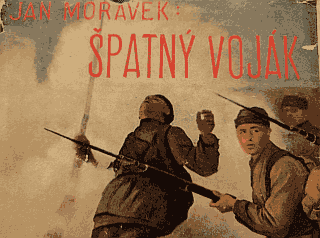
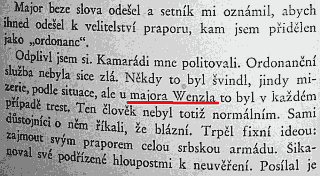
From "Špatný voják".
In 1930 Morávek published a novel that is based on his time with Infanterieregiment Nr. 91 on the Serbian front in 1914. The title is Špatný voják (The Bad Soldier). The novel is autobiographical although it is impossible to verify to which extent the author keeps to facts. The first part deals with his youth and life before the war, his relation to his family in the countryside, his career as an actor and his relationship with women. It also describes his pre-war three-year military service with IR. 91 in Karlín.
His wartime service started with the mobilisation at the end of July 1914. This part of the novel appears authentic, the geographical names and dates of the campaign in Serbia in 1914 are accurate and verifiable, and align very well with Böhmerwalds Söhne im Felde and Egon Erwin Kisch's diary Schreib das auf Kisch!.
Morávek took part in the catastrophic battle of Cer in August and was wounded, Thus he luckily avoided the calamity at the mouth of the Drina on 8 September 1914 were a huge number of k.u.k. soldiers drowned when retreating in panic after a failed attempt to establish a foothold on the eastern bank. The whole operation is vividly described by Kisch and some others.
On 12 September he became messenger (Ordonnanz) for major Franz Wenzel who had just been appointed commander of the 2nd battalion. Morávek's description of Wenzel is merciless: a megalomaniac, madman and coward who gave the most ridiculous orders. This picture is confirmed by Jaroslav Hašek, Bohumil Vlček and also documents from the war archives.
In October 1914 Morávek suffered another injury and with aid of understanding doctors he was transported behind the front line, then home via Osijek - Budapest - Vienna and finally "super-arbitrated" in Budějovice. He then returns to Prague where the book ends.
Army records
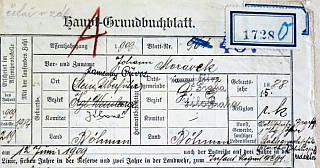
The first page of Morávek's service record.
© VHA
Morávek's army file (Hauptgrundbuchblatt) underpins the authenticity of Morávek's account. He did his military service by IR. 91 in Karlín from 1909 to 1912. He was promoted to corporal during the service and it is revealed that he served in the 7th company (i.e. 2nd battalion). On 28 July 1914 he was called up, and on 1 March 1915, he was super-arbitrated. On 8 May he was called back into service and finally released again on 13 October 1917. The file confirms his pre-war occupation as an editor and actor. Although largely unknown as a writer today, he produced several novels and other prose in the inter-war years and his novel from the Serbian campaign is a vital supplement to other eye-witness accounts from that period.
Sources: Milan Hodík, VÚA
Literature
- Jan Morávek
- Jan Morávek
- Jan Morávek - znáte jeho dílo?
- Festival Mezi řekami 2015 – Pocta Janu Morávkovi
- Jan Morávek
- Díl I.1.9.1924
- Díl II.2.9.1924
- Díl III.3.9.1924
- Díl IV.4.9.1924
- Díl V.6.9.1924
- Díl VI.10.9.1924
- Díl VII.12.9.1924
- Díl VIII.13.9.1924
- Díl IX.15.9.1924
- Díl X.18.9.1924
- Díl XI.20.9.1924
- Díl XII.22.9.1924
- Díl XIII.25.9.1924
- Díl XIV.27.9.1924
- Díl XV.1.10.1924
- Díl XVI.4.10.1924
| a | Jaroslav Hašek - dobrý voják Švejk | Jan Morávek | 1924 |
| b | Jak to bylo v bitvě u Chorupan kde se dal Jaroslav Hašek zajmout | 1972 |
| © 2008 - 2024 Jomar Hønsi | Last updated: 16.4.2024 |



